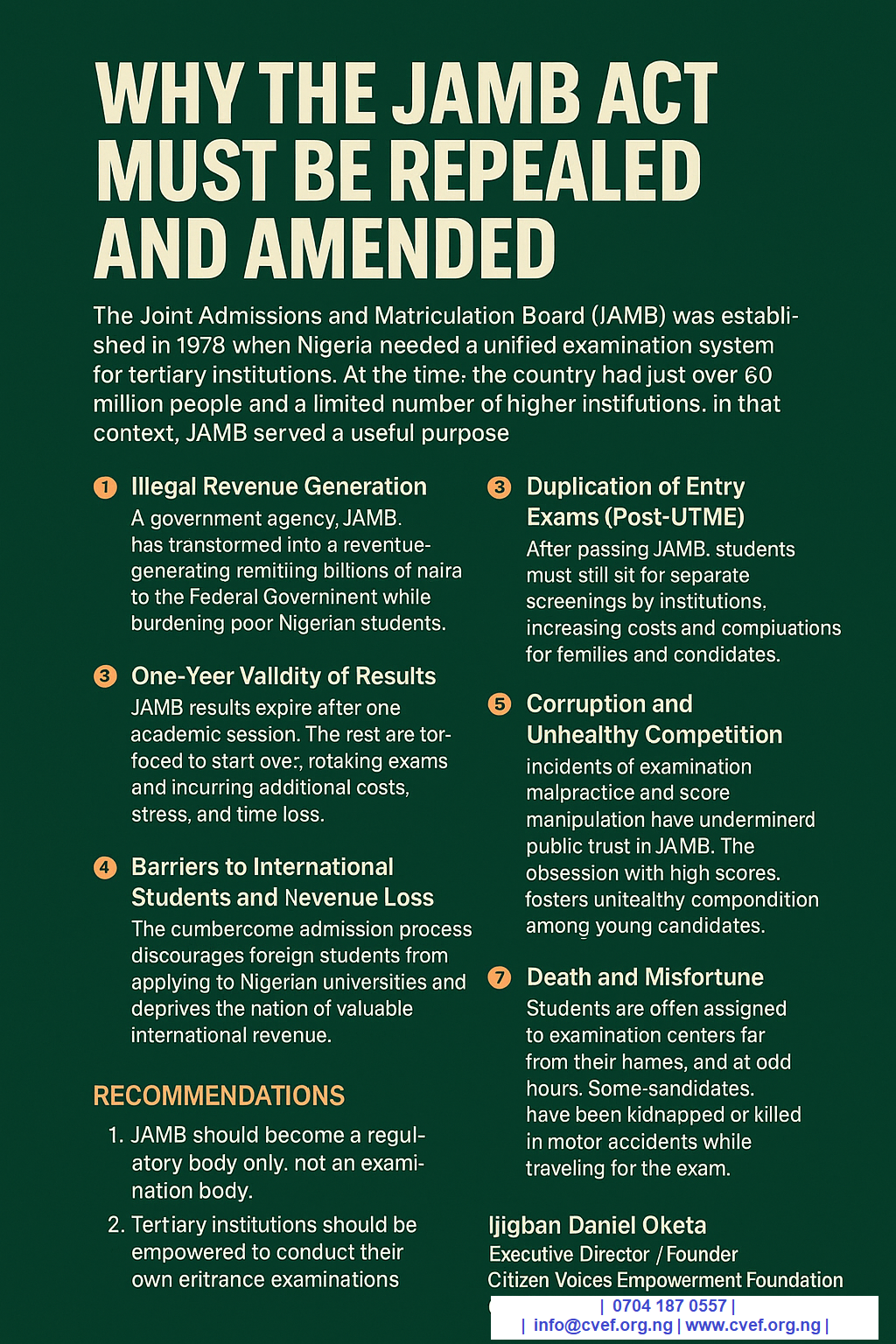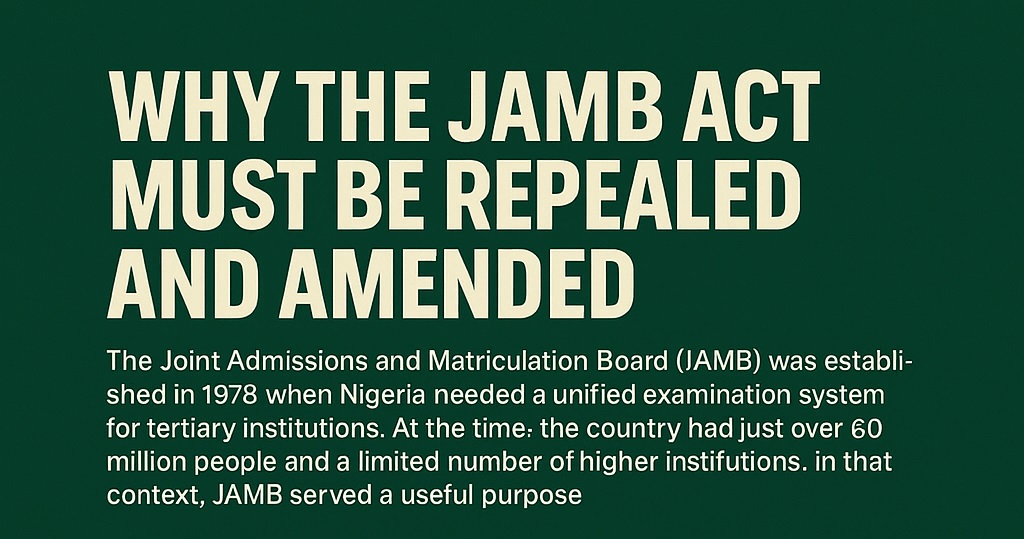The Joint Admissions and Matriculation Board (JAMB) was established by an Act of the National Assembly in 1978 to unify admission processes into tertiary institutions in Nigeria. At that time, Nigeria had a population of just over 60 million, a limited number of tertiary institutions, and relatively few candidates seeking higher education. In that context, the JAMB Act was practical and timely.
However, as of 2025—and long before now—Nigeria’s population has exceeded 220 million, with nearly 1,000 higher institutions and millions of candidates seeking tertiary education annually. In this modern era, JAMB has outlived its relevance and now operates contrary to international best practices. Below are compelling reasons the JAMB Act must be repealed and amended:
1. Illegal Revenue Generation: JAMB, a government agency, has been transformed into a revenue-generating enterprise, contradicting its founding Act. It remits billions of naira to the Federal Government annually while financially burdening millions of Nigerian youths aspiring for higher education.
2. Duplication of Entry Exams (Post-UTME): Despite passing the JAMB exam, candidates are still required to write post-UTME exams by individual institutions. This duplicative process increases financial strain and further complicates the admission journey for students and families.
3. One-Year Validity of Results: JAMB results are only valid for one academic year. Fewer than 50% of candidates gain admission yearly, and those left behind must retake the exam the following year. This system is wasteful and mentally taxing for young Nigerians.
4. Barriers to Foreign Students and Revenue Loss: JAMB’s restrictive processes prevent international students from applying to Nigerian institutions. The requirement to travel to Nigeria to sit for JAMB or post-UTME discourages foreign applicants, resulting in lost opportunities for foreign direct investment (FDI) and international revenue generation. If one argues that foreign students do not require writing JAMB UTME or Post UTIME and they should only present their WAEC result and be considered for admission, then why should Nigerian write need or write JAMB UTME? What a great injustice and bias?
5. Psychological and Emotional Torture: Many students who fail to gain admission despite passing JAMB suffer psychological trauma. The emotional toll can affect their confidence, motivation, and mental well-being, with long-term consequences.
6. Widespread Corruption and Unhealthy Competition: Recent revelations about score manipulation and malpractices have damaged the integrity of JAMB. It also fuels unnecessary competition among young candidates over scores that, in many cases, do not determine final admission outcomes.
7.
Death and Misfortune: Students
are often assigned to examination centers far from their homes, and even at odd
hours. Recently, some candidates have been kidnapped and others killed in motor
accidents while traveling for the exam. These tragedies highlight the
unnecessary risks JAMB imposes on young Nigerians.
8. Against Global Perspective: Globally, including in developing nations, there is no equivalent of JAMB operating as a centralized examination gatekeeper. In most systems, individual institutions are empowered to admit students directly, under regulatory oversight. Nigeria must align with international norms that promote access, innovation, and institutional autonomy.Countries like the United Kingdom earn billions from Nigerian students annually due to simplified and welcoming admission systems. In contrast, our system discourages even domestic applicants, let alone foreign ones.
9. Malfunctioning of Systems and Mass Failure: in the 2025 UTME, where about two (2) million candidates sat for the
examination, only 25% scored above 200 (which is the cut off mark). This means
over 1.5 million people will registered again and new entrants to rewrite again
in 2026 to generate may be N30 to N50 billion naira for the ‘hungry’ Federal
Government. And as a result of an alleged system glitch, which JAMB has failed
to admit, there was so much disparity such that students who scored above 200
in 2023 and over 300 in 2024 now scored just above 100. Some of them are threatening to
take their own lives.
Recommendations
We therefore call on the National
Assembly to urgently repeal and amend the JAMB Act to reflect modern realities:
- 1. JAMB should be restructured into a purely regulatory
body, not
an examination body.
- 2. Tertiary institutions should conduct their own entrance
exams and interviews,
supervised and regulated by JAMB. Institutions should submit the data of
admitted students to JAMB for central records and national planning.
Call to Action
Let this serve as a formal petition to the National Assembly. If this issue is not raised and addressed in the Senate and House of Representatives within the next seven (7) days, we will be compelled to mobilize a peaceful protest at the National Assembly and JAMB headquarters.
JAMB UTME should end in 2025. whatever police, law or regulation that no longer serves the best interest of the people must be repealed, revoked or abolished.
The law is made for the people—not the people for the law.
Yours Sincerely,
Daniel Oketa
Executive Director / Founder
Citizen Voices Empowerment Foundation (CVEF)
0704 187 0557

